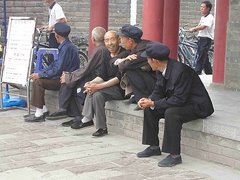Wednesday, May 30, 2007
Drug regulator sentenced to death in Beijing
China is sending signals to the West that it is going to tackle corruption seriously. The court decision is drastic - it's been long since a high level official has not been sentenced to death. Local press believes the sentence is going to be reduced after appeal. The decision is, nevertheless, symbolic.
These news, however, do shake Western countries who are purchasing "serious" products in China, such as medicines and medical equipment. Not only copies are widespread (pirate vaccines, pills and medication made in China have been found throughout the world), but now we learn that "real" medication with the government's stamp can be also fake.
Let's hope this death sentence deters others from doing the same.
AIDS in CHINA
Shows some positive aspects of the AIDS issue in China. Would have loved to see the end of the documentary though.
Sunday, May 13, 2007
Water Pollution in Hong Kong
 There is a lot of information on air pollution in Hong Kong, but on water pollution, information is more scarce. Therefore, I post here an excerpt of an article from the South China Morning Post, published today:
There is a lot of information on air pollution in Hong Kong, but on water pollution, information is more scarce. Therefore, I post here an excerpt of an article from the South China Morning Post, published today:Guangdong's coastal waters have been turned into a huge rubbish dump, with massive amounts of pollution being discharged into the sea, according to an official report.
Feng Weizhong , a senior engineer with the State Oceanic Administration's South China Sea Marine Prediction Centre, said Hong Kong was badly affected by pollution carried by currents from Guangdong.
The Nanfang Daily reported at the weekend that 12.62 billion tonnes of "polluted materials" and 8.3 billion tonnes of waste water were discharged into the waters off Guangdong last year, up 60 per cent from five years ago.
The "2006 Guangdong Sea Environment Quality Report" said offshore pollution had worsened in recent years and the ecological damage in the Pearl River Estuary was irreparable in the short term.
Li Zhujiang , director of the Guangdong Provincial Oceanic and Fishery Administration, which issued the report, asked for more investment and said Guangdong should implement its own policies - tougher than national ones - to cut back on pollution.
The report, which looked at data from 75 water quality stations in 13 cities, said the most polluted offshore areas were at Shantou, Zhanjiang and the Pearl River estuary, which includes Guangzhou, Shenzhen, Dongguan , Zhongshan and Zhuhai .
Water quality off Shantou, Zhanjiang's port and the Pearl River mouth was rated grade four, suitable only for industrial use. Under the mainland's five-tier rating system, water graded one to three is deemed suitable for human consumption.
Of Guangdong's 112 sewage outlets, 84 discharged waste that exceeded standards, endangering marine life. Mr Feng blamed the problem on poor oversight of small and medium-sized cities, towns and villages. While sewerage projects might be effective in urban areas of Guangzhou and Shenzhen, in rural areas, huge amounts of pollution and sewage were discharged directly into rivers.
The report said inorganic nitrogen, reactive phosphate and oil were the main pollutants, while heavy metals such as lead, arsenic, copper and mercury were also widely found.
Mr Feng said most of the pollutants came from household waste and normal production activities.
He said Hong Kong's location left it vulnerable to Guangdong's pollution. In winter, the coastal current swept from Daya Bay past Hong Kong and into the Pearl River mouth, while in summer, it flowed from the Pearl River mouth past Hong Kong to eastern Guangdong.
"If we say that Guangdong's offshore is very polluted, this also affects Hong Kong very badly because the pollutants are trapped in this area with nowhere to go," he said.
Hong Kong has been tackling locally produced pollution with a multibillion-dollar sewage-treatment scheme, the first phase of which went into operation in 2001 on Stonecutters Island. But environmentalists have called for the speedy implementation of the second phase of the scheme, which has improved the water quality in some areas of Hong Kong but worsened it in others.
Friday, May 4, 2007
Lots of video and too little text
Sorry guys, I still have not gotten my act together to write regularly in English... but here is a nice video. I have to get one of these Vodafone cards and blog straight from the beach. (It's going to be a hot, hot summer). In the meantime, I have installed some mosquito nets to get some air in the apartment without getting bitten. Hard to believe, but sometimes I can make my hands do other things rather than typing and cooking.
